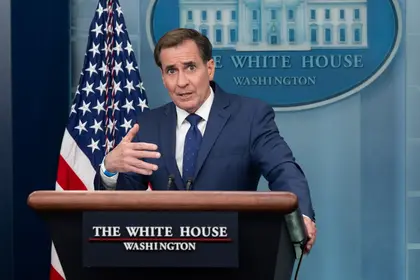This week’s unprecedented drone attack on Moscow, conducted in slightly shadowy circumstances and with no official claim of responsibility, has once again thrown the spotlight on the vexing question for Ukraine’s international partners – is it acceptable for Kyiv to strike targets inside Russia?
For Ukrainians themselves who in recent weeks have lived under constant missile and drone bombardment, the answer is an absolute no brainer.
JOIN US ON TELEGRAM
Follow our coverage of the war on the @Kyivpost_official.
“I am in favor of continuing these attacks,” 62-year-old pensioner Hryhoriy, told Kyiv Post on Wednesday. “Because the [Russian] people there are to blame for everything.
“They live like they are on some other planet. But they must understand what war is, and they must not [be allowed to] relax.”
But for Ukraine’s western allies who still seem afraid of the risk of further escalation of the war with such attacks, the issue is much more delicate, though their position does seem to be softening.
What’s the latest?
On Wednesday, U.S. National Security Council spokesman John Kirby at first appeared very clear on where the U.S. stands on the issue, telling reporters: “We have been very clear with the Ukrainians privately – we’ve certainly been clear publicly – that we do not support attacks inside Russia.
“We do not enable and we do not encourage attacks inside Russia.”

‘Putin Is Destroying Russia by Not Making a Deal’ – Trump Threatens Tougher Measures if Moscow Won’t Accept His Terms
"We have gotten that assurance at various levels," Kirby added, saying that while Washington is whole-heartedly backing the Ukrainian effort to defeat the Russian invasion, it wants to avoid situations that "suck in the West and NATO and the United States" and to "avoid World War III."
That seems pretty unequivocal?
It does, but he then went on to add: “We don't tell them where to strike. We don't tell them where not to strike.
“Ultimately, President (Volodymyr) Zelensky and his military commanders decide what they're going to do.”
So, they’re not actually against it?
Wait, there’s more. Kirby appeared to further hedge his initial statement by adding: “We certainly don’t want to see attacks inside Russia that are being propagated, that are being conducted, using US-supplied equipment."
Has the U.S. supplied any equipment which could be used to attack inside Russia?
The U.S. has so far not pledged or sent any long-range missiles to Ukraine, though President Biden recently said the provision of ATACMS munitions to Kyiv is “still in play.”
What about other equipment like fighter jets?
Kirby also said yesterday that despite the growing tensions over the issue of striking Russia, the White House remains confident that Ukraine will keep its promise not to use US-built F-16 warplanes – set to be supplied by European countries – against targets beyond Ukrainian borders.
What are other countries saying?
The U.K. and Germany appear far more relaxed about the issue.
Britain’s Defense Secretary, James Cleverly, said this week Ukraine has the "legitimate right" to defend itself and can "project force" beyond its borders.
Speaking at a news conference in Estonia, he said: “It has the legitimate right to do so within its own borders of course, but it does also have the right to project force beyond its borders to undermine Russia's ability to project force into Ukraine itself.
He said "legitimate military targets" beyond Ukraine's border are part of its self defense, adding: "We should recognize that.”
The U.K. was the first country to supply Ukraine with long-range cruise missiles, delivering Storm Shadow munitions last month. Cleverly did not specifically address their use.
And in Germany, government spokesman Steffen Hebestreit said international law allows Ukraine to strike at Russian territory in self-defense.
But, just like the US, official Berlin opposes the use of German weapons for such attacks, he added.
What has Russia said about all this?
Dmitry Medvedev, the deputy head of the Russian Security Council and former Russian president, said yesterday that Cleverly’s comments mean that any British official can now be considered a legitimate military target of the Russian Federation.
The UK’s Foreign Secretary Cleverly has stated that Ukraine “has the legitimate right to … project force beyond its borders to undermine Russia’s ability to project force into Ukraine itself.” According to him, legitimate military targets beyond Ukraine’s border are part of its…
— Dmitry Medvedev (@MedvedevRussiaE) May 31, 2023
You can also highlight the text and press Ctrl + Enter










